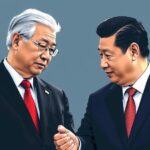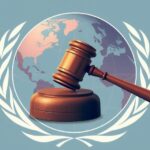Conflicts
Politics
AFGHANISTAN, AMERICA, ASIA, ASSOCIATED PRESS, BIDEN ADMINISTRATION, CONGRESS, DONALD TRUMP, ELON MUSK, EUROPE, INTERNATIONAL RELATIONS, MARCO RUBIO, MUSK, NATIONAL SECURITY, NORTH AMERICA, REUTERS, TRUMP ADMINISTRATION, U. S, U. S. AGENCY FOR INTERNATIONAL DEVELOPMENT, UKRAINE, UNITED STATES, USAID, WAR, WASHINGTON
Omar El-Sharif
Concerns Rise Over USAID Funding Cuts Amid Trump Administration Policies
President Trump’s administration is moving to dismantle USAID, aiming for budget cuts under Elon Musk’s leadership. This has incited fears over humanitarian aid’s future, especially in regions like Afghanistan and Ukraine. Lawmakers stress the necessity for congressional oversight on any proposed changes to USAID, heightening concerns over accountability and support for global aid efforts.
The Trump administration’s efforts to curtail funding to the U.S. Agency for International Development (USAID) have raised alarm among humanitarian organizations. Elon Musk, appointed to lead the initiative, claims that streamlining could save the U.S. $1 trillion, alleging that the agency has operated under a corrupt regime. On February 3, reports indicated that USAID’s headquarters would be closed temporarily amidst these developments.
Trump’s rhetoric against USAID intensified when he referred to its leadership as “radical lunatics” and threatened its future pending a review. The agency, which is crucial to delivering global humanitarian aid, had its website taken offline on the same day, a move indicative of broader administrative changes.
Concerns have escalated following the suspension of two senior USAID officials who attempted to shield agency systems from the newly formed Department of Government Efficiency (DOGE). Musk and Trump have characterized USAID as inefficient, with Musk going as far as labeling it a “criminal organization”.
In light of these actions, notable Democrats have expressed grave concern about the potential fallout from eliminating or merging USAID with other governmental entities, questioning the implications on foreign assistance aimed at advancing U.S. national interests.
The State Department has imposed a freeze on new funding for U.S. foreign assistance following Trump’s directive, aligning foreign aid with administration policy objectives. Secretary of State Marco Rubio has voiced a strict accountability standard requiring that every dollar spent must answer whether it enhances U.S. safety, strength, and prosperity.
Humanitarian organizations fear a disruption in vital aid, particularly concerning Afghanistan where over 22 million individuals rely on assistance. Such a pause could have dire implications according to advocacy leaders in the field.
Trump has been critical of financial aid to Ukraine, claiming excessive support under President Biden. Ukrainian analysts warn that withdrawing USAID could undermine essential civil society initiatives and democratic reforms in the nation, although some local advocates call for an audit of the agency due to concerns about efficiency.
Republican Congressman Brian Mast has shown support for restructuring USAID, suggesting it should be incorporated into other State Department divisions. Senate Democrats have cautioned that any plan to reorganize USAID must first receive congressional approval as mandated by law.
The U.S. Agency for International Development (USAID) plays a pivotal role in providing humanitarian assistance and development funds globally, accounting for over 40% of international aid. Recent shifts in administration under Donald Trump have called into question the future and operational integrity of the agency. The group is vital for addressing crises, and their effectiveness has been spotlighted through funding debates concerning U.S. foreign policy. Elon Musk’s leadership in the initiative to streamline government spending has introduced significant tension regarding how essential services like USAID will function. With opposition from various political segments, there arise implications not only for geopolitics but also for millions reliant on U.S. aid across nations like Afghanistan and Ukraine.
The Trump administration’s aggressive cuts to USAID and its prospective reorganization have prompted significant concern among humanitarian groups and lawmakers alike. Critics fear that curtailing aid will have harmful repercussions in crisis regions, particularly for those dependent on U.S. support. Kenneth political responses clarify that any alterations to USAID must align with legislative requirements, signaling an ongoing debate over the agency’s future in U.S. foreign assistance initiatives.
Original Source: www.rferl.org








Post Comment